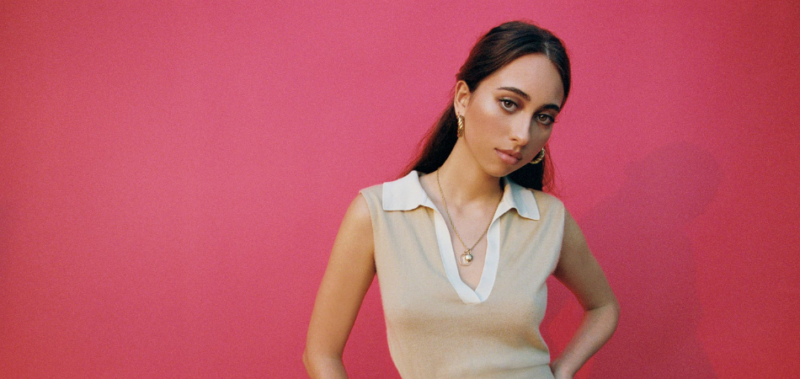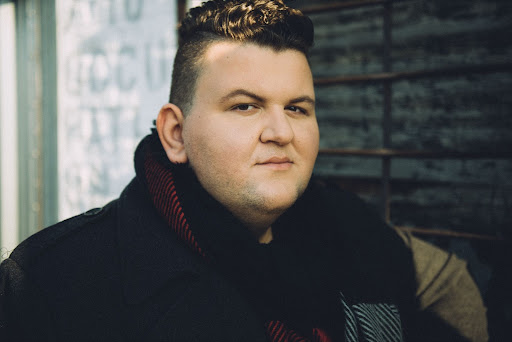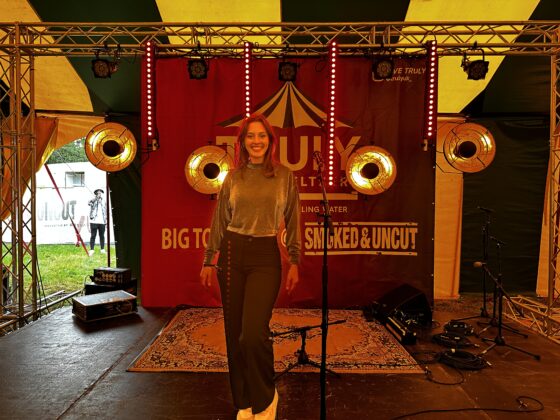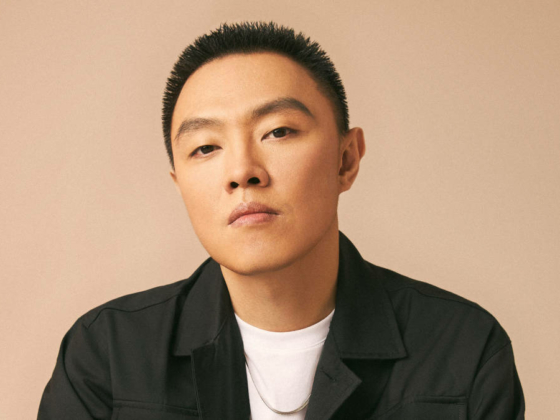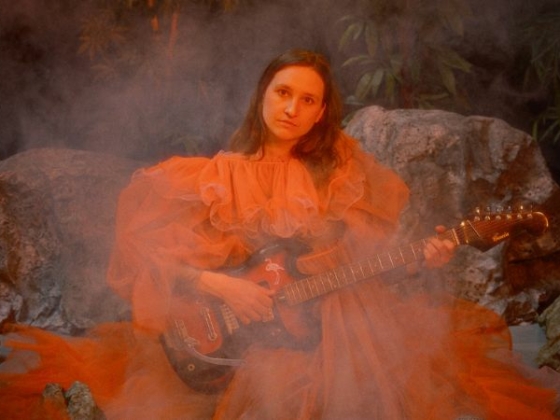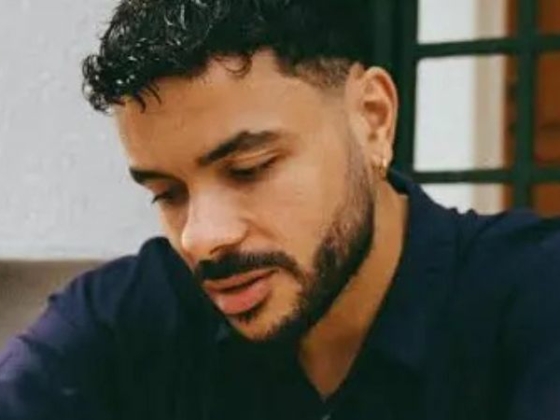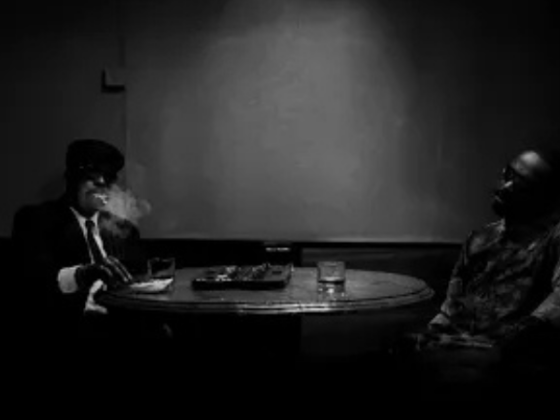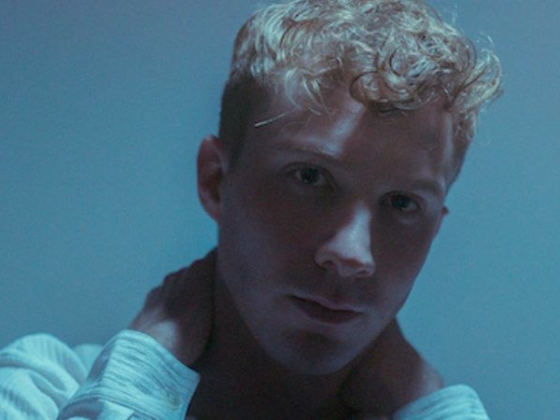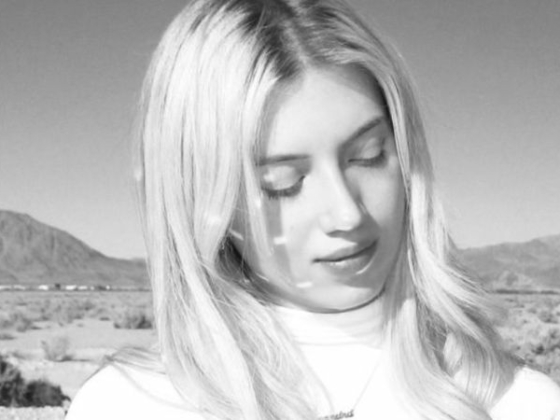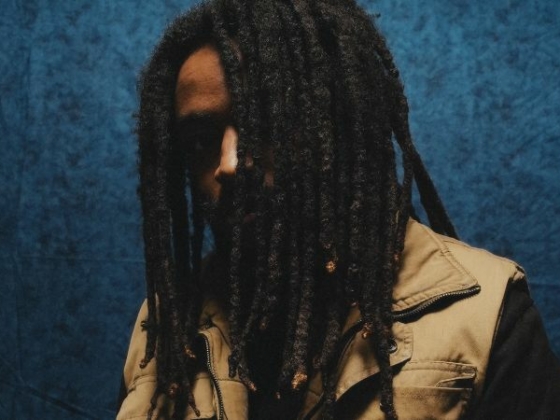Sofia Valdés is at a turning point in her career; one that makes or breaks younger artists when they’re matched against a creative wall, and label deadlines. But where others break under the pressure, she flourishes in the lag time and utilizes a superstar team of producers and writers to create a work that grounds her while pushing her forward. The rising singer-songwriter sat down with EARMILK to discuss working with some of her favorite producers, finding strength in familiar role models, and the hurdles in crafting her latest E.P. Silvia.
Silvia at first glance is a mere collection of five songs that serves to repeat the same E.P. cycle that Valdés has come to build through the last three years of her career, but there’s something more here. Something omnipresent floating in the lyrics and guitar chords.
The EP provides a sense of raw emotion that pervades expectations from such a new artist. Under the limelight, her story is not told in a direct, linear fashion, but thematically through the efforts of a 20-something-year-old musician from Panama, finding passion and purpose under the exotic L.A. lights.
Silvia as the lighter half of a larger project, inspired by the likes of Valdés’ great-grandmother, the late Silvia De Grasse, serves as a reflection on her current position in the music world while drawing strength from her family members who were in the same position.
It tells a familiar story that’s slowly unfolding before the eyes of Valdés’ audience. A story of an immigrant who finds works through her music in an unfamiliar place, amongst unfamiliar people, writing music for an unfamiliar audience. Yet despite all the discomfort, manages to create something that’s especially warm to the ears and familiar to the spirit.
Silvia comes as the first part of a larger album, and despite missing the second half of a full project, the E.P. is still a complete thought. In conception and execution.
Valdés brings a great team of producers onto the formation side of things, utilizing every musical aspect at her disposal to craft a larger narrative with Silvia. Aside from the introspective lyrics touching base on writing block and missing family, Valdés, and executive producer Michael Uzowuru take advantage of creative elements such as the vocal sample on the track “Wild” to build a bridge to reflect Valdes’ ode to her upbringing.
Silvia may serve as an homage mainly through name, but there’s a far deeper meaning drawn out throughout its five-track run. It’s a testament to the singer's resilience, finding strength in the role models that shaped her family tree to thrive in a space that was never really made for artists like her.
"I found a lot of comfort in them and it gave me a safe space and it would always ground me and bring me back”.
EARMILK: How are you today? The new project is right on the horizon so I imagine it’s very exciting.
Sofia Valdes: “I’m excited. I think I was so excited when I had written it but now that it’s coming, It’s no longer on me so I’m just trying to go back to focusing on writing more music.”
“Cause if I focus too much on the drop then I go insane ya know?”
You moved from Panama to LA for school correct?
“No, I studied in Northern Michigan when I was 16. I went to a boarding school there until my senior year and then I went to England for two years to pursue music, and then the pandemic hit and I went back to Panama. When I went to Panama, that’s when I started getting all this attention from labels. Which was insane because I had this SoundCloud link that went viral but only viral amongst the business people. It was very interesting.”
“And then I got signed and I was the last person who got signed at Warner and they couldn't sign anyone for a really long time, and then I had written all the songs before the pandemic hit so when I got signed, they were all done and ready to go.”
How did it feel being the latest Warner Records signee?
“I felt very relieved just cause I was in a situation where I needed to help my family and I was back in Panama and now I had a little money coming in so now I could help with groceries but also I was excited that I could start working and get signed just on the songs I produced in my room.”
You’ve managed to release a consistent project since your debut in 2021 and while the other E.Ps carry their own identity, I want to know what went into the process of writing Silvia.
“Silvia [the song] took a long time to write and to finish really, it was the last one to get done in the project and I really wanted to do something different with the project and really that song started as an experiment. We were just playing with it and we were like ‘Ha ha add these drums, ha hah add this chord’, but then Diana Gordon got involved.”
“And she's a great singer/ songwriter/ musician that I've been a fan of, she's amazing. She then got involved and we wrote the song together and it was like- I felt insecure on how to sing it, and then she helped me. People really liked it and I wondered why people really liked it, it was really weird.”
“There was a sample that we used and it was just an experiment that became one of the singles of the project."
"It did resonate a lot with me because I ended up realizing that the project is about being an immigrant, it’s about me moving here and now knowing why the heck am I here"
What kickstarted that experiment for you? What made you go in the direction that you did?
“Well I’m Panamanian, but my great-grandfather was Cuban and he left Cuba to Panama and my great-grandmother is Panamanian but she married a Dominican man and it’s a very mixed group.”
“He was a Cuban musician and my great-grandmother Silvia did folklore Panamanian music and she was very known for that and I grew up listening to their music and a lot of Brazilian records. I got inspired by a lot of different sounds, but mainly their story.”
“How my [great] grandfather left Cuba to come to Panama and he did music and how hard it was for him, how he ended up living in L.A and how for my [great] grandmother, it was so difficult for her because, obviously it’s a male-dominated industry, but she was very rebellious and yet very loving.”
So your great-grandmother was named Silvia? Was she the core inspiration for the project?
“Yes so the E.P. is named after my great-grandmother because writing this E.P. was a very hard time for me. It got to a point where I wondered why I was here when I could be home with my dog and my mom and be with family. Music is just so hard to get attention if you’re new and it’s hard to get respect to some extent and in those times, I’d wonder ‘How the heck did she [Silvia] do this in the time she was doing it?’”
“This was in the 1940s, 50s, such a long time ago and things are so different now. Back then she was killing it and I ask my dad a lot about her and he said she was very loving and rebellious for the times and the things she would do, she was very artistic.”
“But no, just that one song [is about Silvia]. It did resonate a lot with me because I ended up realizing that the project is about being an immigrant, it’s about me moving here and now knowing why the heck am I here and going through a lot of difficult stuff. Even if I had documents here, I had trouble getting a house, I got denied from seven different houses, and the people I trusted were people not people to trust. It felt like I’m in this country where I don't know anyone and it was just so hard.”
“I was just thinking about my [great] grandmother and how I know she moved around. I know my [great] grandfather moved around. It made me wonder like how. How did they make this work when I just want to go home and be home with my dog. That’s what ties it all up. I found a lot of comfort in them and it gave me a safe space and it would always ground me and bring me back”.
What set this process differently from your past E.P.s?
“I think I put a lot of things on the line for this one. It’s definitely been a very hard ep to write because it’s part of a bigger album. It’s the first half of an album. It was a very strange time for me writing it and I think the circumstances I was in weren't good, let's just say that.”
“In that time, all the music came out. It was a very dark time for me. A lot of things were on the line and a lot of topics were being discussed during this process and it was really hard for me to write, like “Easy” was a very hard song for me to write.”
“And I think Michael opened my eyes to a lot of things and it was mainly to listen to myself and that’s something I find very hard to do. To trust myself and run the songs and write them as I want and with the decision-making. So then he [Uzowuru] would be like ‘Hey this person, come in’ and they would come in for a track or song, and with Carter specifically, we wrote a lot of songs together.”
“There were a lot of people who had crazy names and worked on the industry for so long and know their worth, but also knowing all that, they trust me.”
“Sofia what do you think? “Sofia, what direction do you want?’ It was very eye-opening for me because it made me step up in a way I hadn't before.”
"It was very eye-opening for me because it made me step up in a way I hadn't before.”
There’s a powerhouse of producers present here from Michael Uzowuru to Carter Lang from SZA’s camp, how did this team of producer Avengers assemble together?
“It was mainly because of Michael [Uzowuru]. I had met Michael at the beginning of 2020 right when the pandemic happened. We talked because he really liked one of my songs “Little Did I Know”, and we were doing this Zoom call and I was shaking because I was so nervous to talk to him.”
“He was the sweetest. I would say something about me, and he would go ‘No, don’t say that 'cause you’re not giving enough credit to yourself’, and this was off the first time meeting him. I was like ‘Oh. Yeah! He’s right!”
Did you ever feel that form of pressure?
“That was the craziest part for me. Why are these men, who are supposed to be the scariest people, the kindest and most trusting in me? It was like a brain fart for me.”
“It showed me that it wasn’t weird and that these people believed in me. To see these people who have worked with artists who I have looked up to for years and years, that they trust me, and they listen to me, and they believe in me, it’s insane to me but I’m so grateful.”
On the topic of the production. My favorite piece from the project so far is “Wild” and there are a lot of background noises that creep up. Are those cat cries or children sounds?
“They’re kids screaming my name!”
“It was a sample we found of these kids screaming my name, I was like ‘no way!”
What was the reasoning behind putting them in the background conceptually?
“It just made sense. I was with Dylan Wiggins and Michael in the studio and we were trying to write. It was a few days within the sessions, and I hadn’t written anything. I couldn’t really put my hand on something real and Michael said “You need to go write on the guitar!” And I went to the back part of the studio and I started writing and I came up with all the first song until the chorus and then I brought it in and Michael really liked it.”
“There was this track that was in the same key and when I started singing over it, it was beautiful. I think we just found the sample and put it over. I think the song touches a lot on the past and is retrospective. There’s like a childlike melancholy in it because of something I talk about, It was something I was too young to understand. Now [that I look at it] I would’ve acted so differently and back then, that was the best I knew. Someone screaming my name in that felt like myself in the past calling for help.”
Bringing up the idea that the sample reflects your inner child calling for help, do you feel a sense of healing that inner child?
“Yeah..It was something we were able to translate really well and what really made it for me was in the second verse where Dylan played the drums at the end of the song and he starts going off. Just hitting them so hard and so emotional and I was like ‘more aggressive!”
“That song just means so much to me and it’s the best way to describe how I feel and puts my internal mind into sound.”
“I’ve always stayed because there’s a bigger purpose for my discomfort right now"
With how emotional that song is, I want to ask why is the final song “Barbed Wire”.
“The name of the E.P. was supposed to be “Barbed Wire. Basically, I changed the title later on because I didn’t want the title to be in English. Just because I have so many fans in Panama listening to my songs. Barbed Wire was supposed to be the name of the project. It was the first song I wrote and wasn’t even supposed to be on the project.”
Do you feel like "Barbed Wire: ends the concept you were shooting for or does the second half of the album continue the thought?
“Yeah definitely! It’s an album so once it comes out all together, it’s a different side of me but everything is going to connect and make sense. All the songs are going to complement each other. I originally wanted it all to come out at once as an album, because who says an E.P. changed their life, no albums change lives.”
With what you said about your inner child earlier, what’s something you want to tell your future self?
“Honestly, I know she’s just gonna be such a badass. I say this a lot, but ever since I was younger, I’ve worked so hard on myself in a lot of different ways and I’d remember being 16 and thinking to myself ‘Oh I wonder how I’ll be when I’m 18’ and so forth. And every time I got to 21, I couldn’t envision myself. I had no idea what that would even look like. I never saw myself at 21.”
“There’s this conversation that I’ve heard for girls that ‘if you don’t make it by 22, 23, it’s rough’ and that’s not the type of artist I’m trying to aim to be. My favorite people started making it later on, like not even old, they’re like 33.”
“I have this weird thing that if I can’t see myself at a certain age, it means I’m going to be a completely different person. Someone I probably wouldn’t recognize because I’ve grown so much to be that. So I try to internalize that. And every time I get to 27 I don’t recognize that number so I know that’s going to be my next chapter. I’m really excited to see what I do.”
“I’ve realized, over the past three years that I’m extremely resilient. My mom tells me ‘I have no idea where you get it from.’ Her and my dad would call me crying saying ‘please come back, you don’t have to deal with anything like that, you can come back.”
“I’ve always stayed because there’s a bigger purpose for my discomfort right now. For any of the discomfort I’ve been going through, I know there’s a bigger purpose. To my older self, I’d say to keep up having integrity, loyalty, and self-respect.”
Stream Silvia out now and connect with Sofia Valdes here: Twitter| Instagram | YouTube

